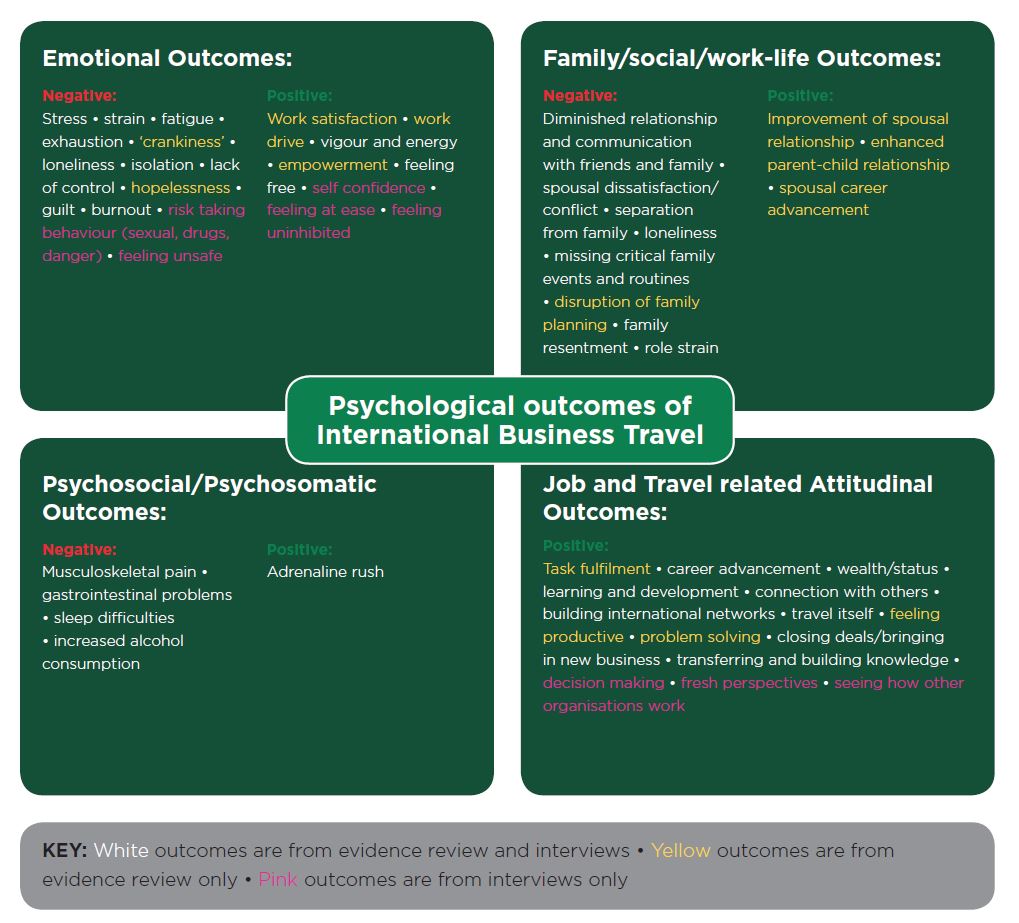
Take a Weight Off Their Mind.
The mental health of your people plays a vital role in their performance while they work abroad.
(…)
(…)
Globalisation and international growth are fundamental to the success of many large organisations. This has driven an increasing need for international business travel.
The most common reasons for international business travel (=IBT), as cited by the Economic Intelligence Unit in 2013, were for meeting existing and potential customers, and attending conferences and networking events. However, despite international business travel being seen as essential for global business, and advantageous in term of career progression for employees, there is evidence that it can be deleterious to health. The majority of research in this area to date has focused on the physical health risk to the traveller, including frequent flyer radiation, infectious disease and illness and cardio-vascular disease risk markers.
International business travel has also been found to be associated with behavioural and psychological issues. These include jet lag, sleep disorders, stress and anxiety, increased alcohol consumption and dependence, exposure to poor nutrition, a lack of exercise (Rogers & Reilly, 2002) and obesity (Richards & Rundle, 2011; Rundle et al, 2017). Socially, it has been found to be related to a lack of opportunity to detach from work, absence from home, distance from support networks and issues with work-family conflict (Unger et al, 2016; Willis et al; 2017). Research (e.g. Donald et al, 2005) has found frequent travellers to make three times as many claims for psychological treatment as non-travellers; and to have a lower psychological wellbeing, work-life balance and productivity than non-travelling colleagues (Icarus, 2006; Rundle et al; 2017).
Psychological ill health of employees has been shown unequivocally to have a direct and significant impact on organisational success, for instance through loss of productivity, absenteeism, presenteeism, and increased conflict and relationship strain within and outside of work. Therefore with the global economy and climate of increasing international business travel, it is imperative that organisations understand how and why business travel may be psychologically damaging, in order that they can both support IBTs (IBT) effectively and protect and sustain the success of the organisation.
The Study
The study has been conducted by International SOS and the Kingston University London.
This research is the first of its kind both to synthesise the existing literature on the psychological implications of international business travel, and to gather perspectives from experts (those who employ and work with IBT) and IBTs themselves.
The study will not only find out what the psychological implications of business travel are; but will start to unpick why it has this impact – by uncovering the organisational, social and individual factors that support and hinder psychological health in IBTs:
-
- Enable stakeholders who have a Duty of Care to their travelling workforce to make evidence-based adjustments and recommendations to their employees around the business travel
- Enable organisations to increase their awareness in their employees about the psychological implications of business travel and therefore mitigate risks
- Ultimately increase the safety, health, security and wellbeing of IBTs by understanding more about the psychological implications of
business travel.
Download here your copy of the study „Keeping International Business Travellers Healthy, Happy and Engaged at Home and Away“.
Psychological Outcomes of International Business Travel

Picture: Courtesy by Pixabay

 Seite drucken
Seite drucken